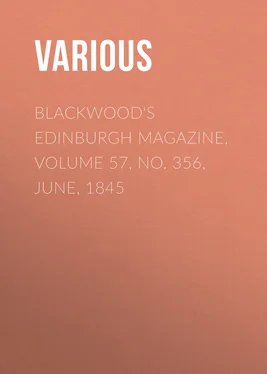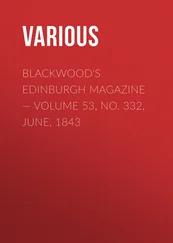Various - Blackwood's Edinburgh Magazine, Volume 57, No. 356, June, 1845
Здесь есть возможность читать онлайн «Various - Blackwood's Edinburgh Magazine, Volume 57, No. 356, June, 1845» — ознакомительный отрывок электронной книги совершенно бесплатно, а после прочтения отрывка купить полную версию. В некоторых случаях можно слушать аудио, скачать через торрент в формате fb2 и присутствует краткое содержание. Издательство: Иностранный паблик, Жанр: foreign_antique, periodic, foreign_edu, на английском языке. Описание произведения, (предисловие) а так же отзывы посетителей доступны на портале библиотеки ЛибКат.
- Название:Blackwood's Edinburgh Magazine, Volume 57, No. 356, June, 1845
- Автор:
- Издательство:Иностранный паблик
- Жанр:
- Год:неизвестен
- ISBN:нет данных
- Рейтинг книги:5 / 5. Голосов: 1
-
Избранное:Добавить в избранное
- Отзывы:
-
Ваша оценка:
- 100
- 1
- 2
- 3
- 4
- 5
Blackwood's Edinburgh Magazine, Volume 57, No. 356, June, 1845: краткое содержание, описание и аннотация
Предлагаем к чтению аннотацию, описание, краткое содержание или предисловие (зависит от того, что написал сам автор книги «Blackwood's Edinburgh Magazine, Volume 57, No. 356, June, 1845»). Если вы не нашли необходимую информацию о книге — напишите в комментариях, мы постараемся отыскать её.
Blackwood's Edinburgh Magazine, Volume 57, No. 356, June, 1845 — читать онлайн ознакомительный отрывок
Ниже представлен текст книги, разбитый по страницам. Система сохранения места последней прочитанной страницы, позволяет с удобством читать онлайн бесплатно книгу «Blackwood's Edinburgh Magazine, Volume 57, No. 356, June, 1845», без необходимости каждый раз заново искать на чём Вы остановились. Поставьте закладку, и сможете в любой момент перейти на страницу, на которой закончили чтение.
Интервал:
Закладка:
Certainly, if I were admitted to the counsels of a novelist, I should never have finished with my list of grievances, my entreaties, and deprecations. I will not inflict it upon you. But there is one little request I cannot help making even to a novelist in embryo. I have been annoyed beyond measure at the habit our writers of fiction have fallen into, of throwing their heroes perpetually into a sort of swoon or delirium, or state of half consciousness. That a heroine should occasionally faint, and so permit the author to carry her quietly off the stage—this is an old expedient, natural and allowable. What I complain of is, that whenever the passions of the hero himself rise to a certain pitch; or whenever the necessities of the plot require him to do one thing, whilst both his reason and his feelings would plainly lead him to do another—he is immediately thrown into a state of half frenzy, has a "vague consciousness" of something or other, makes a complete nightmare of the business; is cast, in short, into a state of coma , in which the author can carry him hither and thither, and communicate to him whatever impulse he pleases. In this sort of dream he raves and resolves, he fights or he flies, and then wakes to confused memory of just what the author thinks fit to call to his recollection. It is very interesting and edifying, truly, to watch the movements of an irrational puppet! I do beg of you, when you take up the functions of the novelist, not to distribute this species of intoxication amongst your dramatis personæ , more largely than is absolutely necessary. Keep them in a rational state as long as you can. Depend upon it they will not grow more interesting in proportion as they approximate to madmen or idiots.
And so, dear Eugenius, you are resolved, at all events, in some form or other, to be the author! This is decided. What was that desperate phrase I once heard you utter—you would strike one blow, though you put your whole life into the stroke, and died upon the broken sword!
Ah! but one does not die upon the broken sword; one has to live on. Would that I could dissuade you from this inky pestilence! This poetizing spirit, which gives all life so much significance to the imagination , strikes it with sterility in every thing which should beget or prosper a personal career. It opens the heart—true, but keeps it open; it closes in on nothing—shuts in nothing for itself. It is an open heart, and the sunshine enters there, and the bird alights there; but nothing retains them, and the light and the song depart as freely as they came. You lose the spring of action, and forfeit the easy intercourse with the world; for, believe me, however you struggle against it, so long as you live a poet, will you feel yourself a stranger or a child amongst men. And all for what? I have that confidence in your talent, that I am sure you will make no ridiculous failures. What you write for fame, will be far superior to what others write for popularity. But these will attain their end, and you, with far more merit, will be only known as having failed. And know you not that men revenge on mediocrity the praise extorted from them by indisputable celebrity? It is a crime to be above the vulgar, and yet not overawe the vulgar. There are a few great names they cannot refuse to extol; men of genuine merit, of a larger merit than they can measure, who yet cannot confessedly approach to these select few, they treat with derision and contempt.
But suppose the most complete success that you can rationally expect—what have you done? You have added one work of art the more to a literature already so rich, that the life of a man can hardly exhaust it; so rich, that it is compelled to drop by the way, as booty it cannot preserve, what in another literature, or at an earlier period of its own career, would have been considered invaluable treasure.
But the question of success or failure is not, after all, the first or most important to your happiness. Could the hope of literary fame, could the passion for it, could the esteem even of its possession, keep a steady place in your mind, there were but little danger in admitting this species of ambition as the ruling spirit of your house. But, alas! whilst it is the most tenacious, it is also the most fluctuating of passions. It rises all radiant with the morning, and before the sun is in the zenith, it forsakes you, and the bright world at your feet is as a glittering desert. But if you should make good resolutions to reform and eject your tyrant, it will not fail to return before the night descends to dash and confound them.
I remember meeting somewhere with the complaint of a young poet who had made trial of his muse and failed; the style was perhaps somewhat quaint, but it spoke the language of truth, and I copied it out. I will transcribe it for your edification, and so conclude this wandering epistle. You must not ask me for the title of the book, for I am not sure that I could give it you correctly. Besides, it would be of no use, as the work I know is out of print.
"I could do better," says the poet in reply to his friend, who had been suggesting the usual consolations and lenitives applicable to the case, "but I could not so far excel what I have written, as to make all the difference between obscurity and fame. It is not a brief and tolerated existence in the world of letters that can be a sanction and motive to my endeavours; and since a noble immortality is denied me, I am willing to sink at once into oblivion. The sentence has been passed. I have not that obstinacy of hope which can make an appeal to the decision of posterity. My labours have been futile—my whole being has been an error—my life is without aim or meaning."
"I sought it not," continued the disappointed bard, "I sought not this gift of poesy—I despised not the ruder toils of existence—I strove to pursue them, but I strove in vain. I could not walk along this earth with the busy forward tread of other men. The fair wonder detained and withheld me. Flowers on their slender stalks could prove an hindrance in my path; the light acacia would fling the barrier of its beauty across my way; the slow-thoughted stream would bend me to its winding current. Was it fault of mine that all nature was replete with feeling that compassed and enthralled me? On the surface of the lake at eventide, there lay how sweet a sadness! Hope visited me from the blue hills. There was perpetual revelry of thought amidst the clouds, and in the wide cope of heaven. This passion of the poet came to me, not knowing what it was. It came the gift of tranquil skies, and was breathed by playful zephyrs, and fell on me, with many a serene influence from the bright and silent stars.
"I saw others pursuing and enjoying the varied prosperity of life—I felt no envy at their success, and no participation in their desires. I could not call in and limit my mind to the concerns of a personal welfare. I had leaned my ear unto the earth, and heard the beating of her mighty heart, and the murmur of her mysteries, and my spirit lost its fitness for any selfish aim or narrow purpose. I stood forth to be the interpreter of his own word to man. Alas! I myself am but one—the poorest—of the restless and craving multitude.
"Gone! gone for ever! is the pleasant hope that danced before me on my path, with feet that never wearied, and timbrel that never paused! Oh, gay illusion! whither hast thou led me? and to what desolation has the music of thy course conducted? I am laden, as it were, with the fruitage of cultivated affections, but I myself am forlorn and disregarded. I kindle with innumerable sympathies, but am shut out for ever from social endearments—from the sweet relationships that make happy the homes of other men. I am faint with love of the beautiful, and my heart pants with an unclaimed devotion—but who may love the poet in his poverty?"
Читать дальшеИнтервал:
Закладка:
Похожие книги на «Blackwood's Edinburgh Magazine, Volume 57, No. 356, June, 1845»
Представляем Вашему вниманию похожие книги на «Blackwood's Edinburgh Magazine, Volume 57, No. 356, June, 1845» списком для выбора. Мы отобрали схожую по названию и смыслу литературу в надежде предоставить читателям больше вариантов отыскать новые, интересные, ещё непрочитанные произведения.
Обсуждение, отзывы о книге «Blackwood's Edinburgh Magazine, Volume 57, No. 356, June, 1845» и просто собственные мнения читателей. Оставьте ваши комментарии, напишите, что Вы думаете о произведении, его смысле или главных героях. Укажите что конкретно понравилось, а что нет, и почему Вы так считаете.












